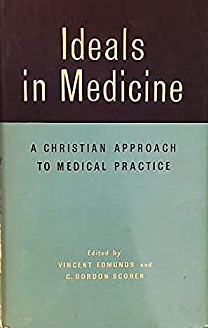This one is actually a joint effort with two others
Ideals in Medicine, A Christian Approach to medical practice edited by V Edmunds and C G Scorer.
Foreword
Some will no doubt greet this book with a weary sigh and comment that “Here is another treatise on a well-worn theme”. That, however, is exactly what it is not! For, strangely enough, comparatively little has been written about Medical Ethics and associated matters. Further, it is apparent that the subject is growing in complexity with each main advance in scientific Medicine. We feel, therefore, that the production of such a book is particularly valuable at this stage in the evolution of medicine.
To any medical student, who may have read thus far and wonders if this concerns him at all, we would put one or to questions. A woman who is dying from a rapidly spreading cancer asks to be told the truth about her condition, but her husband forbids it. What would you do? Would you tell her a lie? Whatever your view of such a case may be, is it ever right to tell patients untruths, or partial truths, or to practice deception in any way?Such questions go to the very heart of one's ethical principles. Again, in some countries, the most the most altruistic and painstaking acts may be grossly misused even by the patient. One of our surgical colleagues, working in a Christian hospital in Asia, excised the patella of a tribesman and made a good job of restoring full function to the knee-joint. As the patient was leaving the hospital, the surgeon enquired why he had so many notches cut on his walking-staff. The proud reply came back that each notch represented a man whom he had killed, and how glad he was to be able to get about again so that he could finish off the blood-feud and add several other victims to his bag!
Or the ancient rules which have been inherited from the Babylonian Medicine of 2250 B. C., or from the Greek Medicine of 400 BC? Who, or What, determines our reactions in these matters? It is true, of course, that slowly over the years medical principles have become to some extent standardised. We must, indeed, be grateful for the high standards which have come to be the guiding influence in Medicine at its best and we must all aim to approximate our Practice to the best that we know. Few leading members of the profession have taken in hand to set down exactly what might be recognised as a universally binding code of medical ethics. Even if they had, they could scarcely have met in advance all the problems and dilemmas which come with each scientific advance.
We would ask, therefore, if there is not a place for conscience as an arbiter? But if its voice is to have its due place, it needs to be adequately informed. The writers of this book are obviously amongst those convinced that the Christian-trained conscience has been the most valuable arbiter in European civilization and should continue to occupy such a place. It is relevant to enquire how far the high standards achieved in the late nineteenth century by doctors in the English-speaking world were the result of deep Christian influence on their education. Such considerations have a bearing not only upon matters of life and death, but upon the problems of human rights, generally, as well as upon such matters as artificial insemination and euthanasia.
To what then must we direct our primary concern? As doctors we are called upon to treat the body. Yet how far can we treat it without taking into consideration the personality as a whole?There is a refreshing story of an earlier Chaplain General of the Forces, who when asked to speak on “Has man a soul?” startled his audience by declaring that the answer was “No!” He went on to explain that “Man has a body, but he is a soul”. We all know now that personality and the interrelation of of soul and body are more complex than earlier scientific Medicine was prepared to allow.
The existing wide gaps in our literature on these subjects are felt especially by younger members of the Profession. What they need is not detailed answers to a multitude of potential problems so much as a statement of general principles, with a few typical applications worked out. The writers of this book have given much time and thought in an endeavour to provide these for them. They have produced a book which will arouse interest. We welcome its publication in the hope that it will so stimulate us all to think these things through for ourselves and prove to be the beginning of increasingly informed and accurate writing on the subject.
W. M. C.
D. M. Ll-J.
H. J. O-E.
(W Melville Capper, D Martyn Lloyd-Jones, Hugh J Orr-Ewing)


